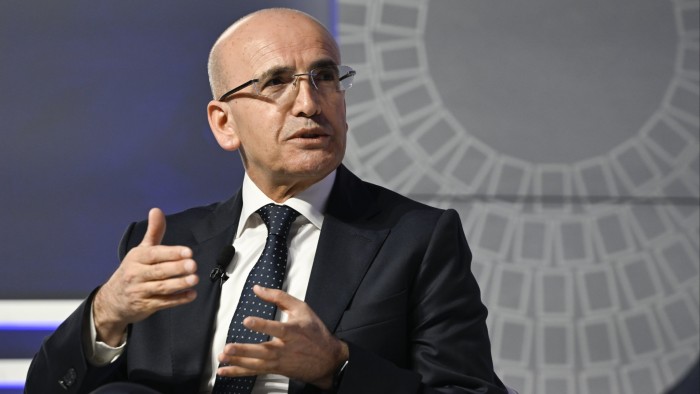Unlock the Editor’s Digest for free
Roula Khalaf, Editor of the FT, selects her favourite stories in this weekly newsletter.
Turkey has a chance to outperform other emerging markets hit by Donald Trump’s tariffs “once the dust settles” thanks to manageable US trade exposure and lower oil prices, the country’s finance minister said.
Mehmet Şimşek told the Financial Times that the collapse in oil prices would narrow the current account deficit of energy-importing Turkey and thus help rebuild international reserves, a closely watched metric of the macroeconomic reforms he launched around 18 months ago.
Slowing global growth and tight domestic money policies were also “disinflationary”, which would help get Turkish inflation down — a central aim of Şimşek’s stabilisation programme.
On US tariffs, Şimşek argued Turkey’s $1.3tn economy was relatively insulated as 80 per cent of its trade is with countries with which it has a free trade agreement, such as its customs union with the EU, or with “friendly neighbours” in the Middle East, central Asia and north Africa.
Trump, who has good relations with Turkey’s President Recep Tayyip Erdoğan, placed the baseline 10 per cent tariff on Turkish exports to the US.
“All of this is relatively constructive,” Şimşek said. “When the dust settles, we hope and believe Turkey could positively decouple” in investors’ eyes from more troubled emerging economies in Asia and elsewhere.
Last year, bilateral trade with the US totalled $32bn, about 5 per cent of Turkey’s overall trade in goods, with a $1.5bn surplus in Turkey’s favour, according to US data.
Şimşek’s economic programme faced its harshest test yet last month following the arrest of Istanbul mayor Ekrem İmamoğlu, the country’s star opposition politician and biggest rival to Erdoğan, sending Turkish financial markets plummeting.
“There was a large but brief impact from domestic political-driven turbulence. Now [the turbulence] is tariff-driven,” Şimşek said in an interview.
“In relative terms, our vulnerability is not so bad. We may have to live with softer growth. But what is, is: you have to live with external shocks such as these [US tariffs],” he said.
İmamoğlu’s detention led to Turkey’s largest street protests in over a decade and forced the central bank to raise interest rates and spend billions to support the currency.
İmamoğlu denies the corruption charges, with critics decrying his arrest as evidence of Erdoğan’s increasing authoritarianism. Government officials have said it shows that nobody is above the law.
The lira has since stabilised and most analysts concur the country has got through the worst of that bout of market instability, although at the price of keeping interest rates high. Inflation fell to 38.1 per cent in March, compared to its peak of 75 per cent last May. Interest rates are currently 42.5 per cent.
Although expected to hold rates this month, Turkey’s central bank is benefiting from “normalisation in domestic dollarisation and non-resident outflows following strong pressure on reserves in the first three days” following İmamoğlu’s arrest, Barclays analysts said in a note.
Şimşek conceded that a slowing Turkish economy would mean lower tax revenues and this “could lead to wider budget deficit” than forecast.
But, Şimşek stressed, the main point of a small fiscal deficit was to help the central bank get inflation down and not to stop Turkish debt rising, which is only around 25 per cent of GDP. The budget deficit had been forecast to fall to 3.1 per cent of GDP this year, from 4.9 per cent in 2024.
“We will maintain spending discipline regardless,” he said. “Big picture, we can live with this.”
Şimşek is viewed as a cornerstone of Turkey’s return to economic orthodoxy after the cheap credit policies previously favoured by Erdoğan brought runaway inflation and a balance of payments crisis.
Recommended
Many investors and analysts also believe that the recent market ructions have strengthened the position of Şimşek and other reformers in government, as their programme provides Erdoğan with an economic bedrock.
“As long as Şimşek stays I think the market should provide an anchor against political instability,” Tim Ash, a long time Turkey watcher and sovereign strategist at RBC Bluebay Asset Management, wrote in a recent blog.
Longer term, however, there are concerns that weak rule of law and continuing political instability could weigh on Turkey’s economy.
Şimşek declined to talk about politics but said he was “all in favour of the rule of law, achieving price stability, enhancing predictability [and] improving the investment climate. Those are music to my ears.”
Additional reporting by Joseph Cotterill in London



